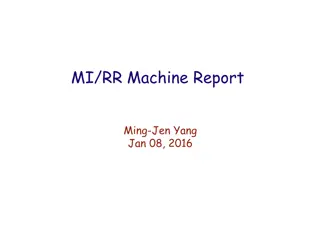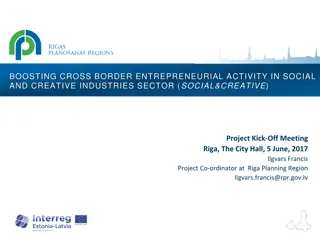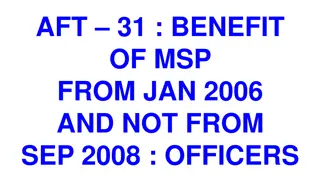
Legal Regulation in Czech Republic: Alternatives to Restriction of Legal Capacity
Explore the current legal framework in the Czech Republic concerning legal capacity and supported decision-making, including the Convention on the Rights of Persons with Disabilities. Learn about the strengths, weaknesses, and implementation challenges of the new legislation in the context of decision-making support.
Download Presentation

Please find below an Image/Link to download the presentation.
The content on the website is provided AS IS for your information and personal use only. It may not be sold, licensed, or shared on other websites without obtaining consent from the author. If you encounter any issues during the download, it is possible that the publisher has removed the file from their server.
You are allowed to download the files provided on this website for personal or commercial use, subject to the condition that they are used lawfully. All files are the property of their respective owners.
The content on the website is provided AS IS for your information and personal use only. It may not be sold, licensed, or shared on other websites without obtaining consent from the author.
E N D
Presentation Transcript
Alternatives to restriction of Legal capacity and supported decision making: legal regulation in Czech Republic Jan Strnad Quip, Prague
Current legal framework in relation to support in decision-making General legal tools Convention on the Rights of Persons with Disabilities (CRPD) New Civil Code (No. 89/2012 Coll.) In force from 1/2014 Social work Act on Social Services (No. 108/2006) Works with social concept of disability, main goal is seen in social inclusion Support in performance of rights and protection of interest is (in various extent) obligatory part of main types of social services
Convention on the Rights of Persons with Disabilities Ratified in 10/2009, published in the Collection of International Treaties in 2/2010, (No. 10/2010 Coll.) Ratification of Optional protocol is being protracted since Czech Constitution - Art. 10: Ratified and published international treaty is part of the legal ordre if the treaty provides something other than statute, the treaty shall apply
Changes in the direction of implementation of Art. 12 New Civil Code Enactment of new legal tools to support people to keep and perform their legal capacity Consideration of these tools has always precede to restriction of legal capacity. Point of the consideration is to asses potential (sufficiency) of the tools to prevent threat of harm from persons legal acts Avoid of plenary restriction of legal capacity www.kvalitavpraxi.cz 4
Weaknesses of the new legislation Does not completely: Just some elements of supported decision making Not for people with more profound disability Doesn't provide comprehensive safeguards , often goes thje way of limitation of duties instead Doesn't avoid restriction of legal capacity implement CRPD Art. 12
Weaknesses of the new legislation in court deciding Present period is crucial for setting standards of interpretation and practical use of new tools. There are many challenges: Despite the change of legal frame the approach of courts is changing quite slowly (keeps on track) Strong tradition of unconsidered adoption of medical expert s (psychiatrists) opinions by judges Poor trust and respect to potential and role of natural support Civil code supposes adoption of special law on guardianship. Process of its adoption is slow, chaotic and does not include people with disabilities
Concluding observations on the initial report of the CR - art. 12 The Comittee notes with concern that the new Civil Code still prescribes for the possibility of limiting one s legal capacity and putting a person with disability under partial guardianship (para 22) The Committee calls upon the State party to amend its Civil Code and fully harmonize its provisions with article 12 of the Convention, as elaborated in the Committee s General Comment No. 1 and recognize the full legal capacity of all persons with all types of disability... (para 23) www.kvalitavpraxi.cz 7
Particular legal tools of support and representation 1. Agreement on Support in Decision-making 2. Guardianship without Restriction of Legal Capacity on application of an individual 3. Advanced Directive/Living will 4. Representation by a household Member www.kvalitavpraxi.cz 8
1. Agreement on Support in Decision-making Agreement between supported person and one or more supporters, must be approved by a court Supporter is entitled to be present at person s legal acts (with consent), countersign them, to facilitate information, give advice Supporter must not influence a decision inappropriately Supporter is entitled to invoke invalidity of supported persons legal acts. It is an ex-post mechanism to protect person from eventual negative consequences of legal acts (It is equal to the entitlement of a guardian). Supporter is not entitled to represent the individual. This tool is thus not applicable for people with more profound disability.
Agreement on Support in Decision-making The tool is originally intended anddesigned to emphasize and frame the role of natural support It does not exclude legal persons from role of supporters and is now being used even by providesrs of social services. It is helpful for instant, but needs systematic concept for future. Potential clash of interest is better prevented in plurality of supporters. 10
2. Guardian without Restriction of Legal Capacity While Court appoints a guardian on request of a person to whom disability causes difficulties in administering property or defending rights determines the scope of guardian s competencies accordingly to the request guardian acts jointly with a person or consistently with his/her will While the will of person cannot be ascertained, guardian has to apply court to take decision court removes guardian on rerequest of person
Guardianship in general Court can appoint a guardian while it is necessary to protect interests of person or public interest, namely while Legal capacity of person is being restricted Disability causes person difficulties in administering property or defending rights Guardianship thus can be appointed with or without restriction of individual s legal capacity Guardianship without restriction of legal capacity is to be used primarily law formulates many new duties of guardian in order to find and respect individuals will and preferences. Contrary, it is not very specific in means of control in this field. www.kvalitavpraxi.cz 12
3. Advanced Directive/Living will Preventive measure Preliminary declaration of individuals will for expected situation of future deficit in mental capacity: How and by his/her affairs should be managed, by whom Who should be his guardian, if necessary If the form is kept, it is binding for eventual deciciding. If it is not kept, directive has to be taken into consideration There is a register of Directives drawn up in the form of a notarial deed
4. Representation by a family/household member For person who lacks mental capacity, it is applicable for representation in common everyday acts Entitled: descendant, ancestor, sibling, spouse, member of household (for 3 years) Representant let the person know he/she will represent him/her, the person can refuse Must be approved by a court, individuals ability to demonstrate wish is sufficient to refuse this form of representation
Restriction of Legal Capacity in the New Civil Code Former full incapacitation (guardianship) Was automatically changed into partial Partial incapacitation (guardianship) can be applied only if otherwise person would be in a threat of significant harm Less restrictive measures are prove not sufficient to prevent this threat (Principle of subsidiarity and proportionality) Expires every 3 years, must be reconsidered
Karlinsk nam. 12, Praha 8 - Karlin e-mail: info@kvalitavpraxi.cz www.kvalitavpraxi.cz 16




















